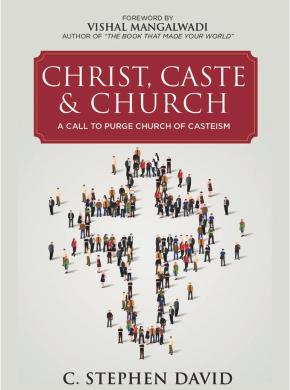 Finished reading an excellent book, Christ, Caste & Church: A Call to Purge His Church of Casteism; written by C. Stephen David. Straightforward, simple and compelling message for this generation of Christians.
Finished reading an excellent book, Christ, Caste & Church: A Call to Purge His Church of Casteism; written by C. Stephen David. Straightforward, simple and compelling message for this generation of Christians.
C. Stephen David has lovingly, passionately and earnestly appealed to the Indian church to repent of the sin of casteism. Profound thoughts are presented in simple English. It is a clarion call for reformation. The author has rightly identified caste as the most damaging cancer that has afflicted the church.
The book has been divided into three sections: The origin and nature of caste system; a biblical response to the caste system; and practical measures to abolish casteism in the church.
The author has analysed the caste system well and has brought out five important aspects of it. They are: hierarchy, heredity, endogamy, definite occupation and social restriction. Explaining the Hindu worldview of caste origin, he brings to focus that a Hindu can convert to any religion, but cannot convert out of his own caste to any other caste. Casteism cannot develop love, but only hate. Honour killing is horrific form of punishment for violating the rules of endogamy; however, there are other milder forms like: ostracism, when all family members, relatives and caste members boycott the victim. Dignity of labour and dignity of labourer is missing because of definite occupation allotted to each caste group. With more education this is reduced in cities, nevertheless it still exists in villages. The people belonging to lower castes are not supposed to aspire for better professions and wealth.
The author of the book emphasizes that ‘Cross unites, caste divides’ and denounces ‘churchless Christianity’ as the believers should be a community. He also condemns caste-based congregations.
The author has given a strong biblical basis for human equality and tolerance. He writes: “Every thought, attitude, and behaviour of caste superiority is a blasphemous denial of all human beings who are created in the image of God” (page 60). The author brings to focus the depravity of human beings and Lord Jesus Christ’s atonement on the cross of Calvary. He emphasizes that ‘Cross unites, caste divides.’ The author denounces ‘churchless Christianity’ as the believers should be a community. He also condemns caste-based congregations and churches which violate biblical values. The dehumanizing and discriminating practice of caste should never be allowed inside the church. All believers are one in Christ and there are no specific caste name prefixed Christians.
The author reminds the readers of the servant attitude of Lord Jesus Christ—that he washed the disciples’ feet. He challenges the upper-caste people like Brahmins to wash the feet of Dalits.
The author proposes several remedial measures the church should urgently take. Teaching sound doctrine (instead of preaching material benefits and worldly prosperity) from pulpits, seminaries, and through TV should eradicate caste system within the church. Churches should have casteless culture. He suggests that Christians should drop off their surname of caste. However, the author fails to note the Dravidian movement in Tamil Nadu has made it mandatory to drop off all caste surnames and, in the past more than four decades, schools do not register surnames. Also, the author calls for casteless and dowry less marriages. The author asks: “Are such caste-centered marriages considered holy in God’s sight?” The author also emphasizes the need for fellowship meals in the church that will eradicate caste hierarchy and bring the principle of equality. Church discipline should include ways and means to eradicate caste in the local churches.
The author also has answered a few questions regarding caste and Christians. He rejects the idea of Christians declaring themselves as Hindus for getting reservation benefits. He also talks about young people giving excuses for the sake of dowry and caste, stating they honour father and mother. The author gives the example of King Asa who removed his mother from being queen for violating God’s commandments. Hence, parents should be honoured but not by violating biblical principles. Even if evangelism is targeted towards a particular caste group, the new believers should be integrated in the whole Body of Christ.
Timely book to be read by all Indian Christians, pastors, especially, should study and preach biblical principles taught in this book. Bible colleges should make this book a mandatory reading for all students. Christian leaders should take lead to bring changes that honour God and not culture and traditions.
Author
C. Stephen David
Publisher
Ekklesia Books
Pages
144
To Purchase





